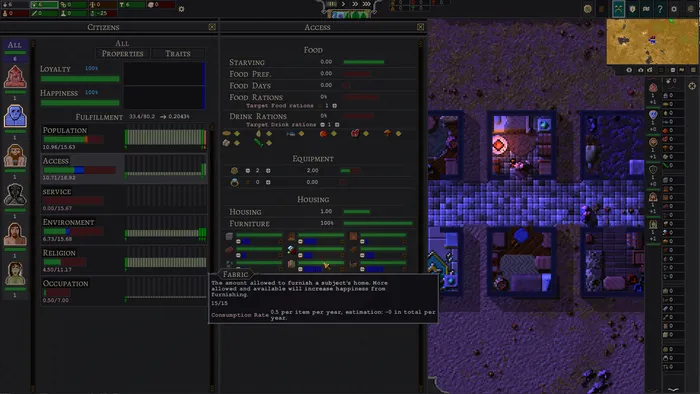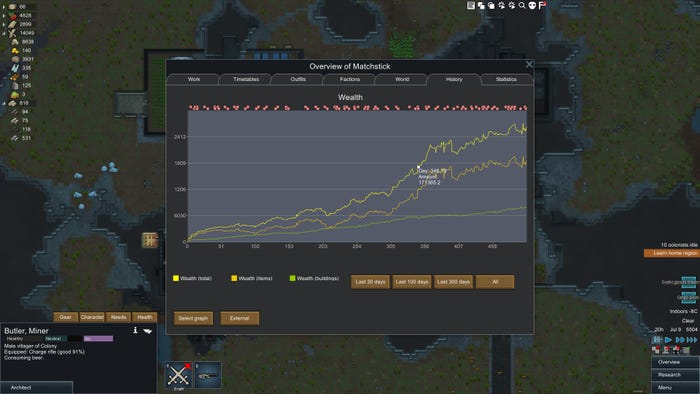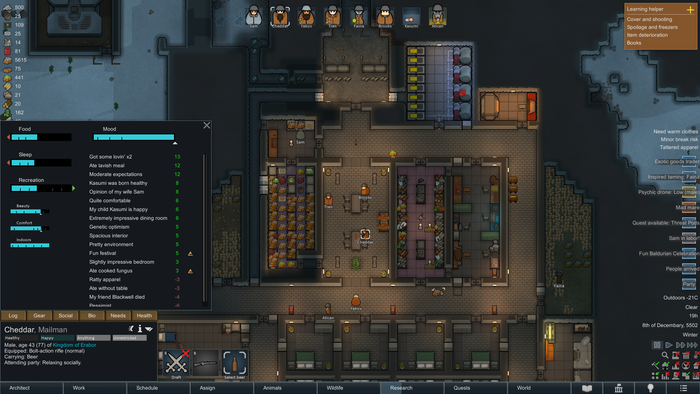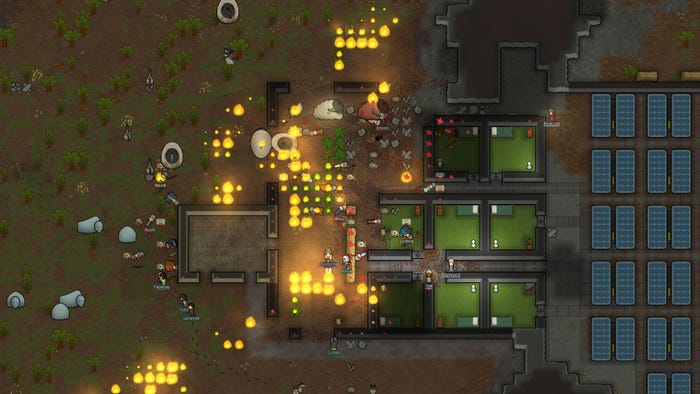
A failure cascade occurs when the failure of one part of a system puts stress on other parts, causing them to fail in turn until the entire system collapses. This concept can be illustrated with a simple ecosystem example: a frog, flies, slugs, and crickets. In a stable ecosystem, the frog eats a variety of prey, allowing each population to replenish and remain stable. However, if an external factor like a pesky gardener using slug pellets wipes out the slug population, the frog is left with fewer food options. This leads to overeating of flies and crickets, causing their populations also to collapse. The resulting cascade leads to the frog depleting all its food sources and eventually relocating to a new garden, because I didn’t want the frog to starve and this story to have a sad ending.
Fortunately, real-world ecosystems are often more resilient due to their depth and redundancies. In contrast, human-made systems, including power grids and transportation networks, are more susceptible to failure cascades as they are too complex to predict points of failure and lack the depth to have built-in redundancies. For instance, the 1965 Northeast Blackout, which left 30 million people without power for 13 hours, was caused by a single relay in one power plant being set incorrectly. Similarly, nuclear disasters and traffic jams often result from a single point of failure causing a chain reaction.
This phenomenon is also evident in games, particularly simulation games that model complex systems, aka the nerdy games I enjoy. Games like Dwarf Fortress, Surviving Mars, and Tropico require players to manage resources, production, and population needs while dealing with randomly occurring crises. The charm of these games lies in the unexpected consequences that can arise from seemingly minor decisions, leading to dramatic and often hilarious stories.
Songs of Syx
Recently, I have been playing Songs of Syx, a fantasy city builder with a deep level of simulation. The game’s most important stat is population loyalty, which is mostly based on citizen happiness. Maintaining citizen loyalty is crucial for a ruler’s success, as disloyal citizens are more likely to go on strike, riot, or attempt to overthrow the ruler. In my latest playthrough, a series of interconnected events led to a catastrophic failure cascade.
.png?width=700&auto=webp&quality=80&disable=upscale)
Citizen info including loyalty and happiness.
I had invested in building a large ornate bathhouse to improve my citizen happiness when a drought struck my city. To prevent famine, I expanded the city’s canal network to irrigate my crops. However, the existing canal network was already low on water due to the new bathhouse, requiring additional pumps to maintain water levels. Then disaster, due to me accidentally executing a citizen wrongly accused of being a serial killer, my citizens lost loyalty. Prompted by this miscarriage of justice all the pump room workers left the city, causing the canal system to fail. As a result, crops died, markets ran out of food, and citizens began starving. The situation deteriorated further as citizens rioted, emigrated to a rival kingdom, and eventually resorted to cannibalism.
Are They Fun?
The question arises: are failure cascades beneficial or detrimental to games? The answer, as with many aspects of game design, is both. Failure cascades can lead to dramatic and unexpected chains of events that generate exciting stories. However, they can also lead to runaway situations that new and veteran players alike will struggle to overcome, potentially resulting in the loss of a game in which the player has invested many hours. The key to a successful simulation game, therefore, lies in striking a balance between allowing dramatic spirals to occur and providing players with opportunities to recover and redeem themselves. Rimworld, in my opinion, serves as an excellent example of a game whose mechanics help achieve this balance.
Rimworld: A Case Study
Rimworld is a Sci-Fi colony management and construction game inspired by Dwarf Fortress and Firefly. It takes place in a universe where humans have spread across the galaxy but have not achieved faster-than-light travel and as a result, the level of technology from planet to planet varies widely. The player begins with three crash-landed colonists who must build shelter to survive, produce food and not go mad with boredom. Players must defend themselves from manhunting animals, cannibal raids and killer mechanoids as well as natural disasters such as solar flares, wildfires and disease.
Dynamic Raids
In Rimworld, the colony’s wealth is a crucial statistic tracked throughout the game. It encompasses various elements such as the number and quality of items, the size and quality of rooms, and the number of colonists. This wealth determines the severity of events and crises, including raids.

A graph of colony wealth over time.
The strength of raids is balanced against the colony’s wealth, resulting in smaller raids for early colonies and larger raids for advanced ones. The strength of the raider’s armour and weapons and how smart their tactics are also factored in. This mechanic reflects a plausible in-game logic: well-equipped raiders target advanced colonies, while a drug addict with a knife is more likely to attack smaller, less developed settlements. This scaling of raids means that an advanced colony recovering from another disaster won’t be punished by large raids and will be given some time to recover, giving the player the chance to prevent a cascade.
Moreover, raids exhibit dynamic behaviour. If raiders incapacitate all colonists and there’s no way for them to fight back, they won’t persist until total destruction. Instead, they may choose to steal items, kidnap colonists, or cause limited damage before retreating. This design choice ensures that losing a raid isn’t a game over; it provides players with an opportunity to recover, rebuild, and seek revenge.
Low Expectations
In Rimworld, colonists are subject to a variety of needs and effects that influence their overall mood. These modifiers range from minor effects like “had a good meal” to major events such as “witnessed an ally’s death” or “got married.” If a colonist’s mood drops too low, they experience a mental break, resulting in uncontrollable and often destructive behaviours. Breaks include depressively wandering, smashing furniture or pigging out on food reserves.

A colonist’s “needs” and overall mood menu.
A crucial design challenge arises when players are starting out with a struggling colony, where resources are scarce, and living conditions are basic. The question emerges: how can players prevent their colonists from descending into murderous rage due to seemingly trivial issues like the lack of tables? The solution comes in the form of a game mechanic known as expectations.
“Low Expectations” is an effect that adds a generous amount of points to colonists’ mood, meaning overall very little is needed to keep their mood high. As the colony develops and conditions improve, colonists will develop more refined tastes. Each new level of expectations from “extremely low” up to “sky-high” adds fewer mood points, necessitating more effort to maintain high morale. This progression continues until colonists become extremely fussy, particularly those promoted to important positions or granted titles whose unique expectations can even permanently subtract points from mood.
The implementation of the expectations system serves as a preventative measure against mood spirals within the colony. If multiple colonists die due to raids or illness, the remaining colonists’ expectations will adjust accordingly. This means during the recovery period from a disaster, minor mood effects—whether it be from inclement weather, envy over someone else’s quarters, or consuming raw human flesh—does not trigger a chain reaction of tantrums and destructive behaviours. By dynamically adjusting expectations based on colony events, Rimworld helps mitigate the risk of cascading failures due to low moods that are impossible to recover from.
The Man in Black
The Man in Black is a unique event in Rimworld that serves as many players’ final lifeline. In the event of all a player’s colonists being incapacitated leaving nobody able to rescue your colonists and medically treat them the player must sit and helplessly watch their colonists freeze, burn or bleed to death—sometimes all three. This can happen after a particularly nasty raid, manhunter animal attack or perhaps a colonist decided to kick some explosive shells during a tantrum. In this hopeless situation, there is a chance that the Man in Black will appear. This mysterious stranger clad in all black will join your colony which means you have the chance to use him to rescue your downed colonists and prevent a game over.

A colony during a massive raid.
The Man in Black is the ultimate deus ex machina, a trope that if overused will hurt the game leaving players feeling as though they are being handheld too much. The Man in the Black event only occurs once per game and only happens in a totally hopeless situation that is impossible to recover from. This preserves the risk of failure while offering a single get-out of jail free card.
Conclusion
In the world of simulation games, failure cascades emerge as both a captivating narrative element and a challenging gameplay mechanic. They offer both the thrill of unexpected twists and the challenge of navigating through adversity. Yet, finding the equilibrium between chaos and recovery is paramount.
Games like Rimworld exemplify this delicate balance, where mechanics such as dynamic raid scaling and expectation modifiers to mood, provide players with opportunities to rebound from setbacks. Additionally, in moments of utter despair characters like the Man in Black serve as a safety net without compromising the thrill of risking failure.
Ultimately, the allure of simulation games lies in their ability to immerse players in worlds where every decision reverberates through intricate systems, leading to triumphs, tragedies, and everything in between. In embracing the art of the spiral, designers can create games filled with drama, resilience, and the ever-present possibility of redemption.






